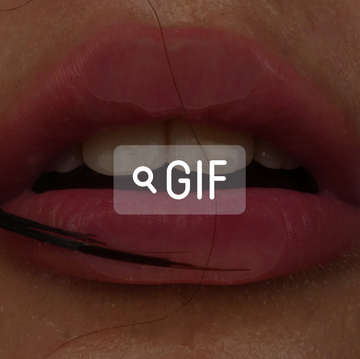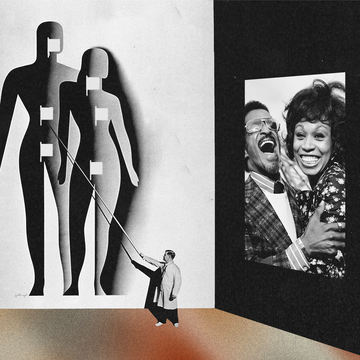As a noted overthinker myself, I’ve occasionally found myself wanting to literally take out my brain and run it under cold water to stop the unwanted thoughts and anxieties that tend to pop up in a relationship—especially a new one. You know, thoughts like, What if they don’t like me the way I like them? What if they’re not really The One? What if we move in together and then things don’t work out? etc.
But while those “what ifs” and anxious spirals may be annoying, you, fellow overthinker, can rest assured that they’re actually pretty common in relationships, says Allison Raskin, author of Overthinking About You. So first things first: Don’t overthink your overthinking. In case you haven’t noticed, who we choose to date, move in with, or potentially spend the rest of our lives with are some rather, ahem, large decisions, so it’s totally reasonable if you’re feeling some anxiety or second-guessing these significant life choices.
Not to mention being in a relationship tends to require a lot of emotional vulnerability. This “opens us up to being hurt, so our brains try to prevent that from happening by making the ‘right’ choice,” says Raskin. The problem? In relationships, you can never really *know* what that right choice might be or how things will turn out because, hi, there’s another person involved and you can’t read their mind! Cue: An anxious spiral that can find you second-guessing every last move, word, and text message—right down to the punctuation placement and emoji choice.
Yes, we’ve all been there. And while putting some serious thought into your significant relationships is totally normal and healthy, there’s a point at which all that anxious rumination definitely isn’t. Fortunately, there are ways to quiet those nagging thoughts. For the sake of your mental health, we consulted the experts on how to stop overthinking in a relationship. Read on for expert tips on getting out of that anxious thought spiral, like, RTFN.
Hello, 911? Why can’t I stop overthinking my relationship?
First of all, let’s talk about *why* overthinking happens. Again, according to Raskin, it’s totally normal to spend a lot of time thinking about your relationship and carefully considering the choices you make and how they might affect your partner(s) and your future together.
If, however, these thoughts about your love life are starting to feel overwhelmingly negative or all-consuming, you may have strayed into extreme overthinking territory. This is often referred to as catastrophic thinking, and former therapist and relationship expert Susan Trotter, PhD, says it could be caused by a lack of confidence in yourself or your relationship. For some, this type of rumination may even get in the way of being able to have and enjoy a healthy partnership.
If uncertainty about your relationship is causing you to overthink, there may also be a lack of communication at play. “People might overthink if they are with a partner who is not open and clear about how they feel,” says Trotter. Anxiety-driven compulsions—like obsessively checking your partner’s location out of fear they might be with someone else—can be reinforced by trust issues, past traumas, and insecurities, Trotter adds. Unsurprisingly, poor communication between partners tends to fuel the flames of whatever underlying issues might be at the root of your overthinking tendencies.
Okay, I’m def an overthinker. What kind of partner is best for me?
Overthinkers will do best in relationships with a partner who understands their concerns and is able to be a calming presence, says Amy Mezulis, PhD. “Partners who understand what anxiety is—whether through their own experience, that of friends or family, or by deeply getting to know you—will be better prepared to approach your anxiety with patience and understanding,” says Mezulis, adding that partners who help you stay calm, challenge negative thoughts, reassure you, and support you in your own efforts to manage your anxiety will be a great match. Hint: These are typically people with secure attachment styles.
What are some tips and tricks to stop overthinking in a relationship?
Kk, so now that we know *why* we’re overthinking, how do we, uh, stop doing it? So glad you asked. Here are some expert tips on how to, simply, chill TF out.
Accept your thoughts
Without acknowledging and accepting our thoughts, we won’t be able to challenge them, says sexologist Lilith Foxx. “Your feelings are always, always valid, and you need to remind yourself of that,” Foxx adds, noting that we can give ourselves compassion without letting the overthinking win.
Remind yourself of what’s *really* going on
Remember that whatever thoughts invade your brain during an overthinking spiral, while valid, are probably not representative of reality. Look for ways to ground yourself in the present and recenter your thinking. For Raskin, that means visualizing a literal stop sign in her mind. For others, it might be saying to themselves, “Hey, I get why you are ruminating, but it’s not actually helpful, so I am going to expend my energy elsewhere.”
Challenge your thoughts
While it may be tempting to just ignore or repress those stressful thoughts, it’s actually worth interrogating them a bit to get a better understanding of where they come from and why you don’t need to listen to them. According to psychologist Elena Touroni, PhD, cofounder of The Chelsea Psychology Clinic, sense-checking your fears effectively keeps them at bay. She suggests asking yourself questions like, “Is this thought fact or opinion?” “What assumptions might I be making here?” “Is there a different way of looking at this?” Challenging your negative self-talk can give you a new outlook on your sitch. Oh, and there are tons of worksheets online to use too.
Distract yourself
Once you return to the present, you can shift your attention to something else. If you’re the planner in your relationship, try making a reservation for two at that tapas place you’ve been meaning to check out to remind yourself that, hi, relationships Should! Be! Fun! Or, if your brain needs a break from your love life entirely, (which, totally valid!) try doing something you enjoy that’s just for you, like hitting up a Pilates class or cooking your favorite meal. Focusing on the things you enjoy outside of your relationship can help increase confidence and independence—which is good for both you and your love life.
Communicate! Communicate! Communicate!
Again, lack of communication tends to be at the root of most overthinking (and most relationship problems in general, TBH). And if you’re already spiraling, failing to communicate with your partner about what you’re feeling can make things even worse for everyone involved.
“When we feel overwhelmed, it can impact energy, attention, and mood. And if we don’t share that with a partner, they may observe or experience these shifts but not understand what they’re about,” says Trotter. Your partner might assume it’s something they’ve done and withdraw, or even wind up down an overthinking rabbit hole of their own.
The solution? You guessed it: Communicate how you’re feeling to your partner. Opening up about your feelings can deepen intimacy, allow your partner to provide support, and help you avoid misunderstandings, says Trotter. Yes, honest communication takes vulnerability, but it’s a must in any healthy relationship.
Practice mindfulness and self-care
Journaling! Mediation! Putting on a motivational podcast during your hot girl walk! Whatever self-care looks like to you, do that. “Immersing your brain in positive activities can turn down the volume on those negative thoughts,” says Mezulis.
Bask in the uncertainty
This is your terrifying yet refreshing reminder that you can’t control the future of your relationship. Yes, obviously we can make decisions that impact our relationships and do our best to make the right ones for ourselves and our partners. But when it comes to most of those big, scary “what-ifs” (like What if we fall out of love? or What if we break up?) the occasionally frustrating reality is that you just can’t know how these things are going to pan out. Our advice? Embrace the uncertainty! Your relationship, like the rest of your life, is a journey. Figuring out where it takes you is all part of the fun.
When is it time to pull in a therapist?
Sometimes practicing these exercises will not be enough to soothe your overthinking. If these issues continue to impact your relationship and/or become too much for you or your partner to handle on your own, you may want to consider seeing a therapist. Here are some signs that it might be time to pull in some professional support for your anxiety.
1. You’re excessively seeking reassurance from your partner
While open communication is ~the golden standard~ for healthy relationship, constantly asking your partner to reassure you about their feelings or your behavior can burden them, says Mezulis.
2. Your functioning is affected
Some anxiety is normal and even to be expected, especially early in relationships. “But when it starts to impact your ability to function, it might be time to seek help,” says Mezulis. “If overthinking keeps you up at night or you find that your ability to perform at school or work is affected, it’s time to reach out to a therapist.”
3. You have physical symptoms
Anxiety can wreak total havoc on the body, so prolonged exposure to an anxious state may start to show up as headaches, muscle tension, or digestive issues, says Mezulis. “If your body keeps sending you signals that your anxiety is affecting it, listen and seek some help.”
Morgan is a Philadelphia-based freelance writer, covering everything from health and sex to fashion and beauty. Her work can also be seen in Bustle, Refinery29, Well+Good, and more. She’s a big fan of these things, in order: silk slip dresses, giving unsolicited life advice, working out, and Taylor Swift’s entire discography.












